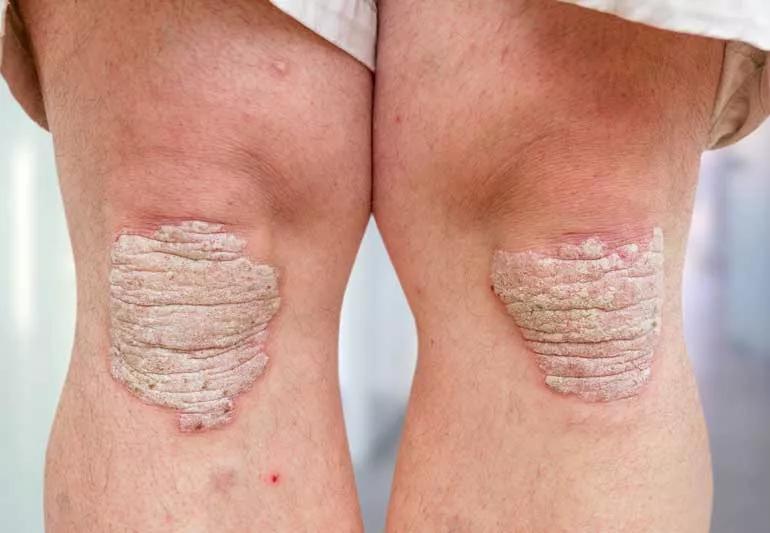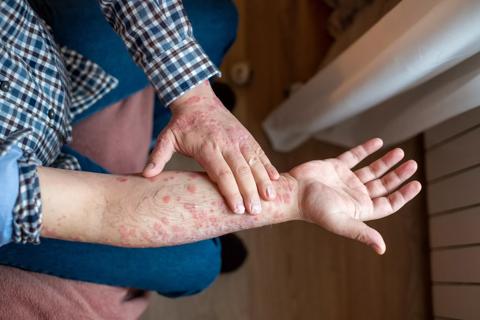Advertisement
Up to 30% of people with psoriasis will develop PsA

While psoriasis and psoriatic arthritis (PsA) have previously been thought to affect only the skin and joints, research in the past few decades has shown that psoriatic disease can impair the entire body, from the inside out.
Advertisement
Cleveland Clinic is a non-profit academic medical center. Advertising on our site helps support our mission. We do not endorse non-Cleveland Clinic products or services. Policy
As an autoimmune disorder, psoriatic disease causes cells in the body to attack other cells.
Dermatologist Anthony Fernandez, MD, PhD, says psoriasis is a systemic disease, and psoriatic arthritis is one potential systemic aspect that can progress quickly. Without early treatment, it can cause significant and irreversible damage to bones and cartilage.
One of the challenges is that diagnosing psoriatic arthritis can be difficult because there are no blood tests that can deliver results telling whether a patient has this problem. Fortunately, there is emerging data suggesting that such tests may be available in the near future.
“Until then, we need to rely largely on clinical signs and symptoms to make a diagnosis,” Dr. Fernandez says. “We often work with our rheumatology colleagues to both secure a diagnosis of psoriatic arthritis and to choose the optimal treatment regimens.”
According to Dr. Fernandez, the majority of people who develop psoriatic arthritis have psoriasis first.
Up to 30% of people with psoriasis will develop PsA, but that can take an average of 10 to 12 years after the skin disease appears. It is not known exactly why the condition takes so long to appear, he says.
Advertisement
Doctors previously believed that if PsA didn’t appear within 10 years of a psoriasis diagnosis, it wouldn’t occur at all. Recent studies, though, have revealed that the risk of developing PsA does not decrease over time for those who have psoriasis.
Ultimately, Dr. Fernandez says, diagnosing psoriatic arthritis as soon as possible is the key to successfully managing it.
“Early diagnosis is important to maximize chances that the proper medications are started,” he says. “That will protect quality of life and joint function.”
Generally, dermatologists treat mild psoriasis in patients without PsA with a topical cream or phototherapy that only penetrates the top skin layers.
However, for someone who has PsA and/or moderate to severe psoriasis, pills or injected medications — often biologics — are needed to control systemic inflammation. There are now many treatment options that effectively control psoriasis inflammation in both the skin and joints.
“Topical medications have no way to control systemic inflammation,” Dr. Fernandez says. “That’s why pills and injectables are so important. They can access the bloodstream and can reduce inflammation all over the body.”
While glucocorticoids are a help, injecting them can carry a small risk of serious joint infection, and side effects make long-term use undesirable. Your doctor will likely screen for active infections or a history of frequent infections when deciding whether to use this therapy.
Some pills may stimulate liver inflammation. They can also reduce blood counts or impair kidney function, he says.
Some of the symptoms of PsA are similar to those of osteoarthritis and rheumatoid arthritis.
If you have psoriatic arthritis, you could experience:
If you see these signs, alert your dermatologist. They can tell you whether you should see another specialist, such as a rheumatologist.
Advertisement
Learn more about our editorial process.
Advertisement

Moisturize often, take oatmeal baths, use Epsom salts and follow a healthy diet to help reduce your symptoms

The common skin condition isn’t contagious, but it can pop up anywhere on your body during a flare

A well-balanced diet with anti-inflammatory foods can help reduce flare-ups and severity of psoriasis symptoms

Caused by inflammation, psoriasis itch can be managed with a variety of treatments, like moisturizing and taking cooler and shorter showers

Stress, infections, skin injuries and environmental factors can trigger an onset of psoriasis symptoms

Learn your triggers, stay moisturized, quit smoking, prioritize sleep — and avoid scratching

Stick to your treatment plan, but keep your provider updated on any new symptoms or triggers

An expert explains the difference between the two skin conditions

If you’re feeling short of breath, sleep can be tough — propping yourself up or sleeping on your side may help

If you fear the unknown or find yourself needing reassurance often, you may identify with this attachment style

If you’re looking to boost your gut health, it’s better to get fiber from whole foods